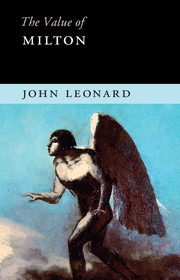Book contents
- Frontmatter
- Dedication
- Contents
- Preface
- Textual note
- 1 Areopagitica, toleration and free speech
- 2 The minor poems and ‘the power / to save’
- 3 The political prose: ‘in liberty's defence’
- 4 Paradise Lost, the sublime poem
- 5 Paradise Lost, ‘solid good’
- 6 Paradise Regained, ‘To the utmost of mere man’
- 7 Samson Agonistes, tragedy and terror
- Notes
- Index
6 - Paradise Regained, ‘To the utmost of mere man’
Published online by Cambridge University Press: 05 July 2016
- Frontmatter
- Dedication
- Contents
- Preface
- Textual note
- 1 Areopagitica, toleration and free speech
- 2 The minor poems and ‘the power / to save’
- 3 The political prose: ‘in liberty's defence’
- 4 Paradise Lost, the sublime poem
- 5 Paradise Lost, ‘solid good’
- 6 Paradise Regained, ‘To the utmost of mere man’
- 7 Samson Agonistes, tragedy and terror
- Notes
- Index
Summary
Readers coming to Paradise Regained for the first time are often surprised to find that the poem's subject is the temptation in the wilderness. The opening lines do not even mention the crucifixion:
I who erewhile the happy garden sung,
By one man's disobedience lost, now sing
Recovered Paradise to all mankind,
By one man's firm obedience fully tried
Through all temptation, and the Tempter foiled
In all his wiles, defeated and repulsed,
And Eden raised in the waste wilderness.
(1.1–7)The link between Christ's ‘obedience’ and Adam's ‘disobedience’ is biblical (Romans 5:19), but Christ's ‘obedience’ was usually taken to mean willing submission to death. Milton uses the word in that sense in Paradise Lost when the Son shows ‘Filial obedience: as a sacrifice / Glad to be offered’ (3.269–70). Here in Paradise Regained, ‘obedience’ means rejecting ‘temptation’. The Son's death is not completely absent from the poem. Jesus (1.260–4) and Satan (4.382–8) both foresee it, and (as we shall see) Jesus twice makes unwitting references to his suffering on the cross. His mission is not complete when the poem ends. The angels celebrate his victory over Satan as a beginning, not an end: ‘Queller of Satan, on thy glorious work / Now enter, and begin to save mankind’ (4.634–5). We can only speculate as to why Milton avoided the crucifixion. Perhaps he found it unsuitable to his gifts. He never confronts it directly in any completed poem. His one attempt to do so, the early poem ‘The Passion’, was a failure and he left it unfinished. Temptation is a central theme of all Milton's great poems.
What does it mean for Jesus to be ‘tempted’? Christopher Ricks notes how Paradise Regained is built on a ‘paradox’: ‘Christ must be both above temptation (in so far as he is God) and yet subject to temptation (in so far as he his man)’. If he ‘does not seem to have even the faintest possibility of falling, His victory must seem a mechanical one and no true counterpart to the Fall of Man’. Some have thought that the Son's victory in Paradise Regained is indeed ‘mechanical’ and that he is never ‘tempted’ in the full human sense. But the ‘full human sense’ has its own difficulties.
- Type
- Chapter
- Information
- The Value of Milton , pp. 106 - 126Publisher: Cambridge University PressPrint publication year: 2016



